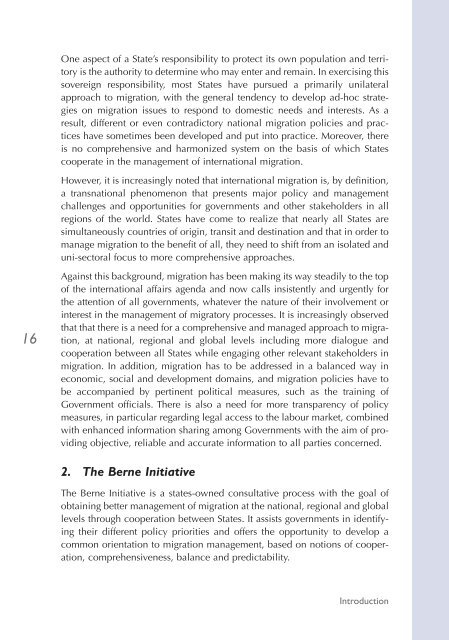Chapitre III - UNITAR
Chapitre III - UNITAR
Chapitre III - UNITAR
Create successful ePaper yourself
Turn your PDF publications into a flip-book with our unique Google optimized e-Paper software.
16<br />
One aspect of a State’s responsibility to protect its own population and territory<br />
is the authority to determine who may enter and remain. In exercising this<br />
sovereign responsibility, most States have pursued a primarily unilateral<br />
approach to migration, with the general tendency to develop ad-hoc strategies<br />
on migration issues to respond to domestic needs and interests. As a<br />
result, different or even contradictory national migration policies and practices<br />
have sometimes been developed and put into practice. Moreover, there<br />
is no comprehensive and harmonized system on the basis of which States<br />
cooperate in the management of international migration.<br />
However, it is increasingly noted that international migration is, by definition,<br />
a transnational phenomenon that presents major policy and management<br />
challenges and opportunities for governments and other stakeholders in all<br />
regions of the world. States have come to realize that nearly all States are<br />
simultaneously countries of origin, transit and destination and that in order to<br />
manage migration to the benefit of all, they need to shift from an isolated and<br />
uni-sectoral focus to more comprehensive approaches.<br />
Against this background, migration has been making its way steadily to the top<br />
of the international affairs agenda and now calls insistently and urgently for<br />
the attention of all governments, whatever the nature of their involvement or<br />
interest in the management of migratory processes. It is increasingly observed<br />
that that there is a need for a comprehensive and managed approach to migration,<br />
at national, regional and global levels including more dialogue and<br />
cooperation between all States while engaging other relevant stakeholders in<br />
migration. In addition, migration has to be addressed in a balanced way in<br />
economic, social and development domains, and migration policies have to<br />
be accompanied by pertinent political measures, such as the training of<br />
Government officials. There is also a need for more transparency of policy<br />
measures, in particular regarding legal access to the labour market, combined<br />
with enhanced information sharing among Governments with the aim of providing<br />
objective, reliable and accurate information to all parties concerned.<br />
2. The Berne Initiative<br />
The Berne Initiative is a states-owned consultative process with the goal of<br />
obtaining better management of migration at the national, regional and global<br />
levels through cooperation between States. It assists governments in identifying<br />
their different policy priorities and offers the opportunity to develop a<br />
common orientation to migration management, based on notions of cooperation,<br />
comprehensiveness, balance and predictability.<br />
Introduction
















